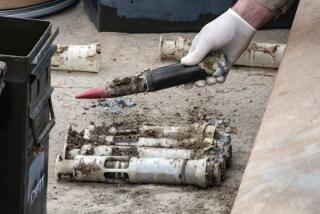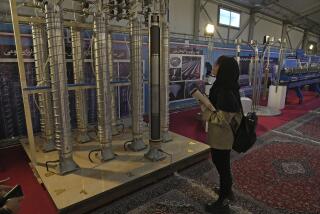Individuals Supplying Nuclear Trade, Officials Say
WASHINGTON — As U.S. and international officials trace the flow of nuclear weapons technology to Libya, Iran and other countries, they are uncovering new evidence that private individuals, rather than governments, have become key sources of nuclear parts and know-how.
Diplomats and U.S. investigators examining the Iranian and Libyan programs say that a nuclear black market has flourished beneath the radar of governments and international watchdogs, fed by scientists and engineers affiliated with Pakistan’s nuclear arms program.
Bush administration officials believe that Pakistan’s current inquiry into its scientists’ activities will change the decades-long consensus on the nature of the nuclear proliferation threat.
Until now, most counter-proliferation measures -- including the Nuclear Nonproliferation Treaty -- have been focused on restricting the spread of weapons technology by states. A black market existing outside those controls presents a more complex problem, officials say.
Pakistan had been suspected of providing nuclear expertise to Iran and North Korea, but information that has emerged in recent weeks provided compelling evidence that Pakistani technology has been spread more widely than imagined, diplomats and nonproliferation experts say.
Pakistani scientists are believed by U.S. and International Atomic Energy Agency officials to have sold to Iran, North Korea and Libya detailed plans for enriching uranium using gas centrifuges. The Pakistanis are also suspected of having provided a shopping list to Iran and Libya that allowed the nations to tap into a global black market producing arms-related components for the nuclear industry.
“There is a black market that did not exist before and that nobody imagined,” a senior diplomat in Vienna said in a recent interview. “We are seeing cases where what is bought is almost turnkey facilities.”
The first glimpses of the market came late last fall. Iran, under pressure from the U.S. and other countries, agreed to open the books on its nuclear program to inspectors from the International Atomic Energy Agency, or IAEA. The information provided by Iran included the names of several Pakistanis who Tehran said had played a role in its nuclear efforts.
Diplomats familiar with the IAEA inquiry said that the trail led directly back to senior scientists with the Pakistani nuclear establishment, including Abdul Qadeer Khan, the so-called father of Pakistan’s atomic bomb.
The diplomats also said centrifuges examined in Iran were identical to those of Pakistani design and had been used outside Iran to enrich uranium. A senior European diplomat said the IAEA was still awaiting tests on those centrifuges to determine whether they could have come directly from Pakistan.
Pakistani government officials initially rebuffed requests from the IAEA that they question Khan and other scientists, but after pressure from Washington, they launched an inquiry.
So far, Khan has been questioned and several of his associates from the nuclear program remain in custody and could face criminal charges. Pakistani President Pervez Musharraf said last weekend that information from the Iranians had implicated Pakistani scientists. He said the inquiry would be pursued as far as necessary to determine how Pakistan’s nuclear technology was shared.
“We are carrying out an in-depth investigation and ... we will sort out everyone who is involved,” Musharraf told reporters at the World Economic Forum meeting in Switzerland.
Additional evidence implicating Pakistan emerged when IAEA inspectors were permitted into 10 nuclear-related sites in Libya in late December and earlier this month. Diplomats familiar with the findings said Libya had set up small numbers of centrifuges that were clearly based on more advanced, “second-generation” Pakistani designs.
“The Libyans had centrifuges based on both the Pakistani G-1 and G-2 designs,” said a European diplomat. “They also had been given instructions on how and where to purchase other components.”
The diplomat and other government officials cautioned that Pakistan was not the sole provider to Libya and Iran. They said restricted nuclear technology had come from a European country and other nations. A shipment of centrifuge components bound for Libya and seized in October by the United States originated at a factory in Malaysia, U.S. officials and diplomats from other countries said.
What is not clear is whether the Malaysian plant where the components were manufactured knew it was making centrifuges or was simply turning out components to specifications provided by Libya.
But some subterfuge was involved. Svend Andersen, the managing director of BBC Chartering & Logistic, a German firm that owned the ship carrying the components, said in an interview that they were in a container labeled “building materials” bound for Libya.
BBC Chartering, which was praised by U.S. authorities for its cooperation, picked up the shipment from a firm in Dubai, United Arab Emirates, and did not inspect the contents.
A central question in the Pakistani investigation is whether it will implicate some of the country’s past military leaders. Pakistan’s nuclear program was under the tight control of the military, and many diplomats and nonproliferation experts said it was inconceivable that the scientists could have acted without the knowledge of senior military officials.
As for combating the black market in nuclear technology, government officials and experts said a mix of measures was required, starting with understanding how the material got to Iran and Libya.
“The U.S. has to undo the network and to do that we really need to know how the facility in Malaysia got started,” said George Perkovich, a nonproliferation expert at the Carnegie Endowment for International Peace.
The U.S. also is expected to push for tougher penalties worldwide for individuals and companies that violate export laws on technology used in weapons of mass destruction, administration officials said.
More to Read
Sign up for Essential California
The most important California stories and recommendations in your inbox every morning.
You may occasionally receive promotional content from the Los Angeles Times.










